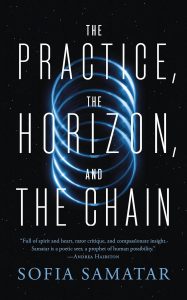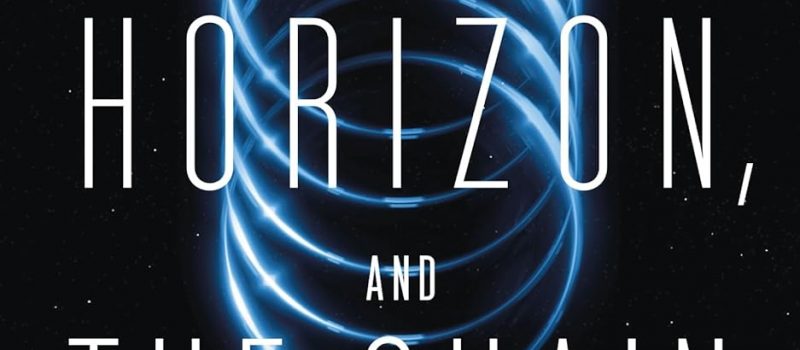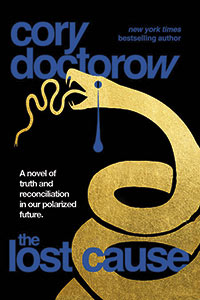Gary K. Wolfe Reviews The Practice, the Horizon, and the Chain by Sofia Samatar
 The Practice, the Horizon, and the Chain, Sofia Samatar (Tordotcom 978-1-2508-8180-9, $18.99, 128pp, tp) April 2024.
The Practice, the Horizon, and the Chain, Sofia Samatar (Tordotcom 978-1-2508-8180-9, $18.99, 128pp, tp) April 2024.
Generation starship stories tend to come in a few distinct flavors, with distinct character types. There are the refugees, trying to keep humanity alive while escaping a dying or overpopulated Earth (the sort of wishful fantasy that Kim Stanley Robinson set out to demolish in Aurora a few years ago). There are the colonizers, out to find and take over new planets just because that’s just what humans do, and there are the hopelessly confused who have forgotten they’re on a starship at all, whose history is lost or corrupted or mythologized, and who are inevitably in for a rude awakening as soon as someone finds a window. But perhaps the most interesting variety are those tales in which the characters are recognizable figures from our own institutions and history – not stylized enough to be allegories, but which can hold up a mirror in the way allegory does – except with real characters. Rivers Solomon used the setting to effectively model racism and slavery in An Unkindness of Ghosts, and much of that rigid segregation is also reflected in Sofia Samatar’s The Practice, the Horizon, and the Chain. But Samatar has far more on her mind than generation starships, and the novella has as much in common with a kind of narrative much rarer in SFF: the academic novel. In addition to presenting a brutally dehumanizing social structure, Samatar’s characteristically gorgeous prose also carries the undertone of someone who has sat through plenty of frustrating committee meetings, tried to introduce change to an entrenched system, or grappled with issues of equity, opportunity, and intellectual freedom in the face of corporate interference and senior faculty sinecures – all presented with a sense of realpolitik that makes it surprisingly resonant with some very real current anxieties. In fact, the key words in her tripartite title can be all read as metaphors of the promises and challenges facing educators.
The initial point of view is that of a nameless boy who labors in the bowels of a giant starship, one of a fleet operated by the powerful United Mining corporation, which maintains a rigid separation between ‘‘the Hold’’ and the elite ‘‘upstairs.’’ Despite the backbreaking work and appalling conditions – he’s even chained to the wall, like other workers – the boy develops a talent for drawing by using sharp objects and even his chain to make pictures on the walls of his cell. This draws the attention of a professor, who selects him for a chance to study at the University, much as her own father had been chosen. But she’s facing her own challenges in the University, where even the textbooks must be approved by the corporation, and which divides the curriculum into the Newer Knowledge and the Older Knowledge – which will look familiar to anyone who’s been near a university in the last several decades – and she reveals her own sympathies by noting that ‘‘My father taught the skills we need to survive in the vastness of space… I teach the skills we need to humanize space.’’ Shades of humanities department budget defenses (or is it just the former academic in me having flashbacks?).
If all this begins to sound a bit like a treatise, the vivid poetry of Samatar’s descriptions and the passion of her characters turns it into a moving human drama. The boy’s utter terror at being removed from his familiar surroundings, grim as they were, is palpable, and the professor’s sometimes testy interactions with her colleagues and a seemingly intractable system are all too credible. As they begin to form an unlikely alliance, the boy shares what he has learned from the prophet, his longtime mentor in the Hold. The practice, he said, was ‘‘the longing for understanding’’, and the horizon was a feature on ancient Earth which invited you ‘‘to look neither up nor down.’’ As these ideas begin to inform the professor’s central question about her profession – ‘‘Can the University be a place of both training and transformation?’’ – the two of them set in motion what might be the beginning of revolutionary change, or might backfire entirely. The Practice, the Horizon, and the Chain takes on a number of heavy issues for a relatively modest novella, but never loses focus on the dreams of its two memorable central characters, or on the power of its distinctive setting.
This review and more like it in the March 2024 issue of Locus.
 While you are here, please take a moment to support Locus with a one-time or recurring donation. We rely on reader donations to keep the magazine and site going, and would like to keep the site paywall free, but WE NEED YOUR FINANCIAL SUPPORT to continue quality coverage of the science fiction and fantasy field.
While you are here, please take a moment to support Locus with a one-time or recurring donation. We rely on reader donations to keep the magazine and site going, and would like to keep the site paywall free, but WE NEED YOUR FINANCIAL SUPPORT to continue quality coverage of the science fiction and fantasy field.
©Locus Magazine. Copyrighted material may not be republished without permission of LSFF.








